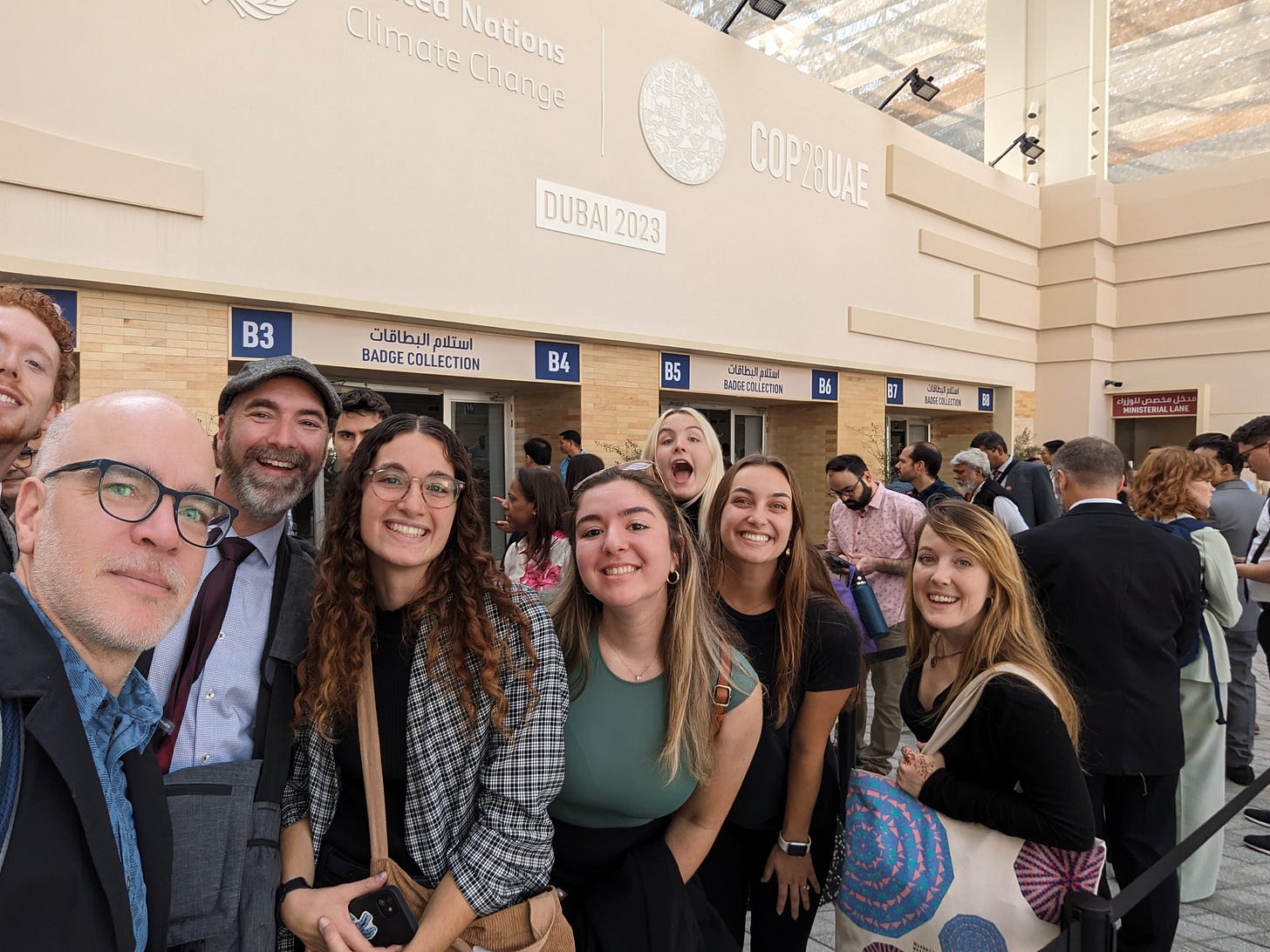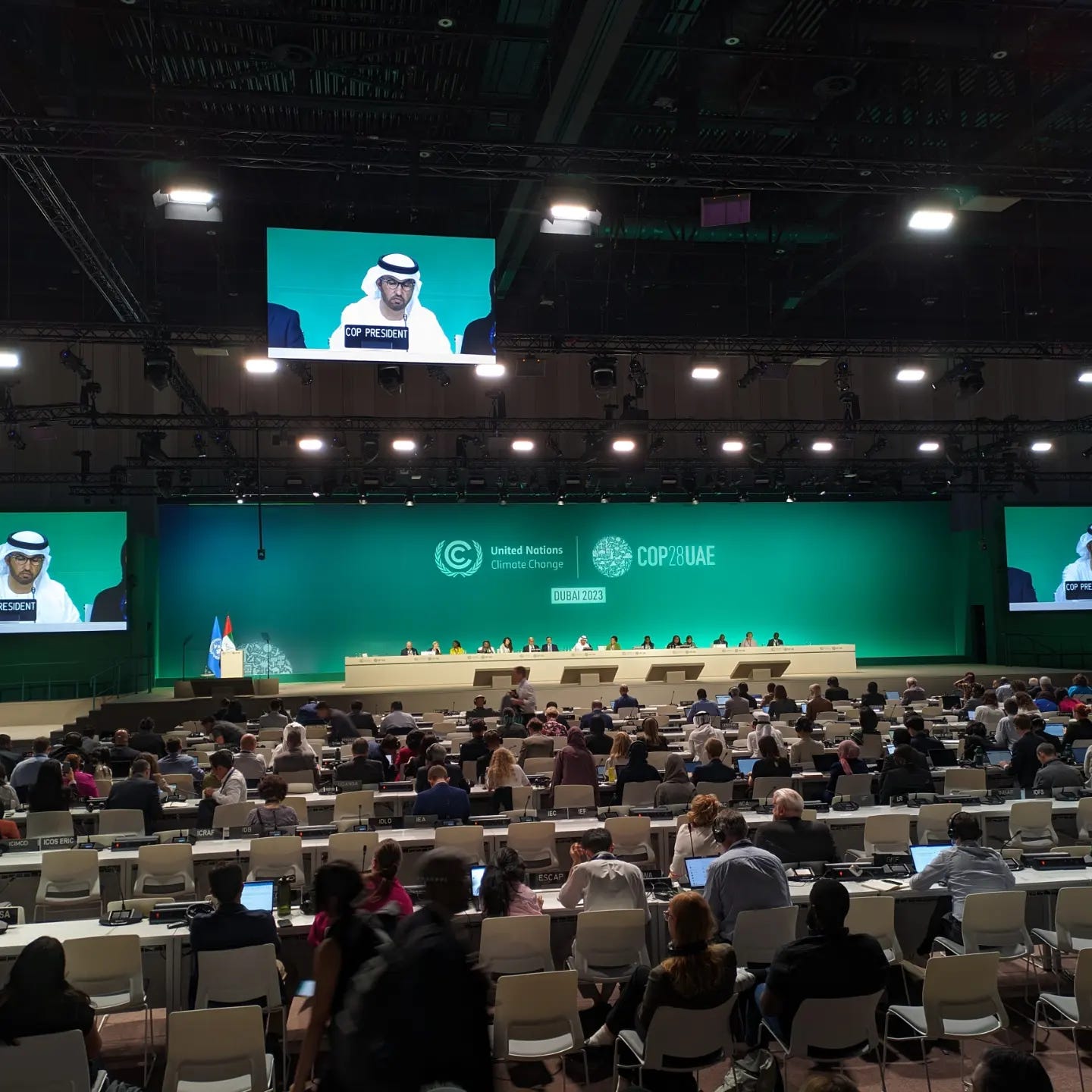The room in question was more like an arena, and the “it” in question was mostly the reading of reports. Maybe not exactly the stuff that future musicals will be made of. But here I am now in the midst of COP28.
It was quite the adventure getting to that room today. It began with our CCOP group having devotions together and hearing a bit of the history of the group’s engagement with COPs. After President Trump pulled the USA out the Paris Agreement that was made at COP21 in 2015, a group of CCOPers were organized to attend the next COP to say, “We’re American Christians, and we want the world to know that despite the official actions of our country, we stand by the commitments made.”
Hearing more of the history of CCOP made me understand how similar this work has been to the science and faith work I’ve been involved in at BioLogos. The people discovering the organizations for the first time had the feeling of: I have found my people. That is a deeply satisfying and meaningful connection.
From our basecamp, we braved the metro system again. I thought when I rode it the other day it was the most cramped I have ever been in a subway car, but today’s was worse. It is really unbelievable how many people press into the car. You are in complete contact with every side of your body with another person. That is why some of the cars are designated for women only. It made me wish there was another car designated for middle aged men only. After about 30 minutes of that, the car started thinning out, and for the last 3 stops (I think we went more than 25 stops all together), I even got a seat.
The next phase of the adventure was to get the official registration badge. We were herded through turnstile lines, and it was really quite efficient. Then we were unleashed into the Blue Zone.

I’m not sure what I was expecting, but it is much bigger and more chaotic than that. Evidently in area, the Blue Zone is about the same size as Central Park in NYC. There is one part of the Zone that is for official sessions (about which more anon), and then the other part (probably 95% of it) that is like a big fair. Instead of the hog barn and tilt-a-whirl though, there are country pavilions and other groups that organize events. Most of the events are speeches and panels, and then there are rallies happening up and down the avenues. I’ll plan to sample these as the week goes on, but today I wanted to see some official business.
COPs have settled into the pattern of having the big fancy people show up on week 1 to do some PR and make some headlines, and then in the second week the bureaucrats settle in do the actual business of the COP. So I was actually pleased to stumble into the big plenary room, where none other than Sultan Al Jabar, the president of COP28 (and the CEO of the national oil company in UAE), was presiding.
For the first hour I sat there, it was very rote and formalized reporting on the progress from two committees: the Subsidiary Body for Scientific and Technical Advice, and the Subsidiary Body for Implementation. But they didn’t say much interesting at all. Both reported by saying, “Mr. President, besides our best efforts, we could not finish our assigned work. Find the details in the document labeled F:///COP28/SBSTA/CMA dot something or other.” I kid you not, probably 20 times I heard someone say a variation on the same thing, and then read out the entire URL for some server where the documents are stored. Evidently this is all about the commitment to transparency. But I have to say that transparency is really boring.
The next hour got more interesting. Sultan Al Jabar then outlined how the work of the COP is going to progress in the next week. Several times he’d say, “Hearing no objections… it is so decided.” But then one time after saying, “Hearing no objections…” he said, “Ah, I see that Cuba would like to say something.”
The room is kind of like the United Nations, where there are country delegates all around, and we observers sit behind them. The delegation from Cuba was given the floor, and started speaking in Spanish. That led to a scramble by the observers around me to go back to the table where they handed out headsets for translation. I grabbed one and heard the end of the objection about negotiation sessions being held at times that were not conducive for nations like Cuba. The president said, “Thank you for your statement, and be assured that we will take your requests under advisement.” Then he said there will be time later for other countries to make statements. I decided to wait around for some of these.
Before that, though, was the Executive Secretary of the UNFCCC (the United Nations Framework Convention on Climate Change, which is the overarching body that puts on the COPS). He made a strong statement: “Colleagues, if you don’t bend the curve of emissions in the next two years, we’ll pass important milestones that we will not recover from. The transition we need to make now is nothing compared to the one we will be forced to make if we cross 1.5 degrees.” He was given a rousing round of applause. Then Sultan Al Jabar started calling on country reps to make statements.
First Samoa was called on, a woman made an impassioned speech about how the Small Island Developing States were at tremendous risk from rising sea levels. And there were many other small countries that made speeches like that. Then Saudi Arabia was called on, and their representative said (I’m paraphrasing): we don’t need to worry about emissions so much; we need to adapt; we have always done that. And we will not put up with any decisions made that undermine our national sovereignty. In other words, don’t tell us what to do, just deal with what we in fact will continue to do.
That made Columbia stand up and take the mic and say (again paraphrasing): “We have set limits on emissions, and there are parties here in this room who are planning to double the amount of oil they produce. There is no scenario where this is consistent with limiting warming to 1.5 degrees. Look, we in Columbia are the 5th largest exporter of coal, but we see we have to phase that out. And we’re a small economy compared to you guys; this is going to be very hard on us. But we are committed to doing it. How about you do your parts too?!”
It received a rousing round of applause.
Then I wandered around a while and found the Sierra Leone building. My wife and I lived there for a year, so I thought it would be fun to see them. It was a small group of about 10 people sitting in a room, where a couple of teenage girls were talking. They were very passionate about leaders needing to listen to youth and involve them in decision making. The accents brought back such memories. After the session I stayed in my seat, hoping for the chance to talk to someone. A woman walked up to me and asked who I was and why I was there. I answered that I had lived in Kabala long ago before the war (no, not WWII). She instantly started speaking Krio to me, which didn’t go so well. I mumbled a few words back that I could remember, but she quickly reverted to English and told me about the plight of women farmers in Sierra Leone because of the flooding that occurs every year now. It was very sad to hear that they are bearing the brunt of climate change that they had very little to do with causing. So I apologized for that. And then she wanted me to be in a bunch of pictures with them. That was pretty fun
I’m trying to process all of this. I can tend to be a little cynical about the efficacy of giant meetings like this. The official proceedings have lots of grandstanding and promises. But seeing so many people who are passionate about the work of caring for the planet is pretty inspiring. I stopped in the faith pavilion a couple of times today too, and loved hearing from people all over the world who are motivated by faith (Christian and otherwise) to do this work. I hope before I’m done here that I’ll be able to articulate some of that a little better and inspire others for it too.






Really interesting to hear what actually happens at these!